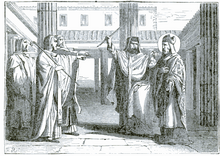Barsauma (died 456)
Barsauma[1] (died 456)[2] was a Syriac-speaking monk and holy man, a leading opponent of the Council of Chalcedon of 451. He is the subject of a biography in Syriac composed about a century after his death. He is regarded as a saint by the Oriental Orthodox.[3]
Barsauma was responsible for the destruction of numerous temples and synagogues between 418 and 423. According to ancient sources, when he visited the synagogue of Rabba (Areopolis), its doors miraculously opened, and the synagogue was set on fire. Looting was forbidden by Barsauma's order, and the synagogue burned to the ground. It is unclear if local Jews had converted to Christianity.[4]
In 438, Barsauma and forty of his followers attacked Jews praying at the ruins of the Temple in Jerusalem, killing many.[5] He was tried, but claimed innocence, saying the stones were cast from heaven, and eventually acquitted.[5]

In the Council of Chalcedon, he was accused by Bishop Diogenes of Cyzicus of killing Patriarch Flavian of Constantinople at the Second Council of Ephesus. According to Diogenes, a group of Barsauma's monks beat up Flavian while Barsauma cried "Strike him dead!". Flavian died of his injuries a three days later. The Acts of the Council of Chalcedon record that, when the bishops heard this, they exclaimed "Barsumas is a murderer, cast him out, out with him to the arena, let him be anathema".[6][7][8]
Notes
[edit]- ^ Classical Syriac: ܒܪܨܘܡܐ, romanized: Barṣawmo; Greek: Βαρσοῦμας, romanized: Barsoumas.
- ^ Brock 2021.
- ^ Van Rompay 2018.
- ^ Sivan, Hagith (2008). Palestine in Late Antiquity. Oxford University Press. p. 178. ISBN 019160867X. Retrieved 2 Sep 2022.
- ^ a b Nau, François (1927). "Deux épisodes de l'histoire juive sous Théodose II (423 et 438) d'après la vie de Barsauma le Syrien". Revue des Études Juives. 83 (166): 184–206. doi:10.3406/rjuiv.1927.5553.
- ^ "St. Flavian, Martyr, Archbishop of Constantinople | EWTN". EWTN Global Catholic Television Network. Retrieved 2024-05-10.
- ^ Evagrius Scholasticus. Ecclesiastical History (AD431-594), Book 2. Translated by E. Walford. ISBN 978-0353453159.
- ^ Charles Joseph Hefele. A History Of The Councils Of The Church. ISBN 978-1500177898.
Sources
[edit]- Brock, Sebastian P (2021). "Review of Palmer 2020". The Journal of Theological Studies. 72 (2): 1007–1009. doi:10.1093/jts/flab128.
- Fiey, Jean Maurice (2004). Saints syriaques. Darwin Press.
- Palmer, Andrew N., ed. (2020). The Life of the Syrian Saint Barsauma: Eulogy of a Hero of the Resistance to the Council of Chalcedon. Transformation of the Classical Heritage. Vol. 61. University of California Press. doi:10.1525/9780520972988. ISBN 978-0-520-97298-8.
- Van Rompay, Lucas (2018). "Barṣawmo". In Sebastian P. Brock; Aaron M. Butts; George A. Kiraz; Lucas Van Rompay (eds.). Gorgias Encyclopedic Dictionary of the Syriac Heritage: Electronic Edition. Beth Mardutho. Originally printed by Gorgias Press, 2011.
